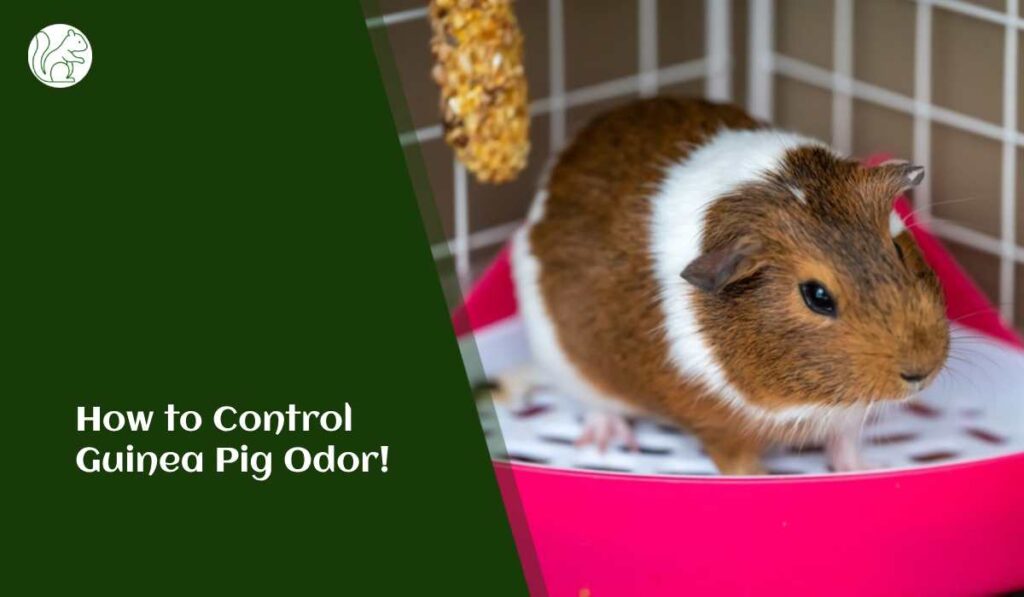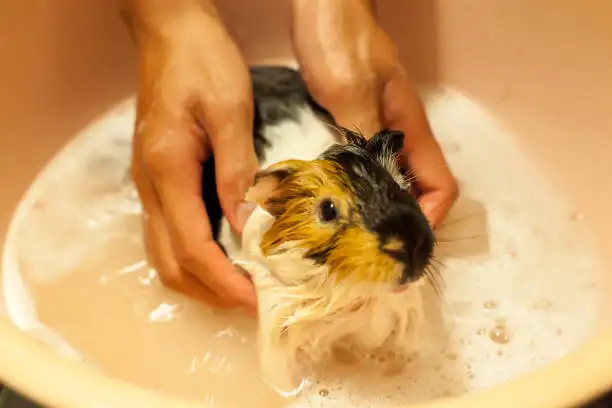If you are a guinea pig owner, you know how delightful these small, furry creatures can be. However, one common issue that many guinea pig owners face is dealing with the strong odor that can emanate from their pets. Don’t worry; in this comprehensive guide, we’ll explore how to control guinea pig odor under control and create a pleasant environment for both you and your furry companion.

Clean the Cage Regularly
One of the primary causes of guinea pig odor is an unclean cage. Guinea pigs are sensitive animals, and they can be messy. Aim to clean their cage at least once a week thoroughly. Remove soiled bedding, uneaten food, and droppings. Wash the cage with mild soap and water, ensuring it’s completely dry before adding fresh bedding.
Choose the Right Bedding
The type of bedding you use can make a significant difference in controlling odor. Avoid using cedar or pine shavings as they can release strong odors and potentially harm your guinea pig’s respiratory system. Opt for paper or fleece bedding, which are absorbent and less likely to produce unpleasant smells.
Proper Ventilation
Good airflow is essential to prevent the buildup of odors in your guinea pig’s living space. Ensure that the cage is placed in a well-ventilated area with enough fresh air circulation. Avoid positioning the cage in damp or humid spaces as it can exacerbate the odor problem.
Maintain a Balanced Diet
A guinea pig’s diet can influence its body odor. Provide a balanced diet rich in high-quality hay, fresh vegetables, and a limited amount of guinea pig pellets. Avoid overfeeding and remove any uneaten food promptly. Proper nutrition can contribute to a healthier, less smelly pet.
Regular Grooming
Regular grooming of your guinea pig is essential to control odor. Brush your pet’s fur gently to remove loose hair and debris. Additionally, guinea pigs are known to produce a substance called “sebum,” which can lead to a musky odor. Bathing should be kept to a minimum, as excessive bathing can strip the skin of natural oils and cause more odor.
Use Baking Soda
Baking soda is a natural and safe odor absorber. Sprinkle a thin layer of baking soda under the bedding in your guinea pig’s cage to help neutralize odors. However, be cautious not to use too much, as excessive baking soda can be harmful to your pet.

Regular Health Check-ups
Foul odors can sometimes be an indication of an underlying health issue. Schedule regular check-ups with an experienced exotic pet veterinarian. They can ensure your guinea pig is in good health and detect any potential problems early on.
Separate Elimination Area
Consider setting up a separate elimination area within the cage. Guinea pigs tend to designate a specific spot for their bathroom needs. Placing a litter box with some bedding in this area can help keep the rest of the cage cleaner and reduce odors.
Avoid Strong Scents
While it may be tempting to use air fresheners or scented candles to mask odors, these strong scents can be overwhelming for your guinea pig. Stick to natural odor-control methods to ensure your pet’s well-being.
Hydration
Ensure your guinea pig has access to clean, fresh water at all times. Proper hydration can help flush out toxins and minimize odors.
Spend Quality Time Outside the Cage
Allowing your guinea pig some supervised playtime outside the cage can help reduce odors. It allows their living space to air out while providing exercise and mental stimulation for your pet.
Conclusion
By following these effective tips, you can keep guinea pig odor under control and enjoy a fresh and pleasant environment for both you and your furry friend. Remember, a clean cage, proper ventilation, a balanced diet, regular grooming, and natural odor-control methods are key to maintaining a happy and odor-free life for your adorable guinea pig.
